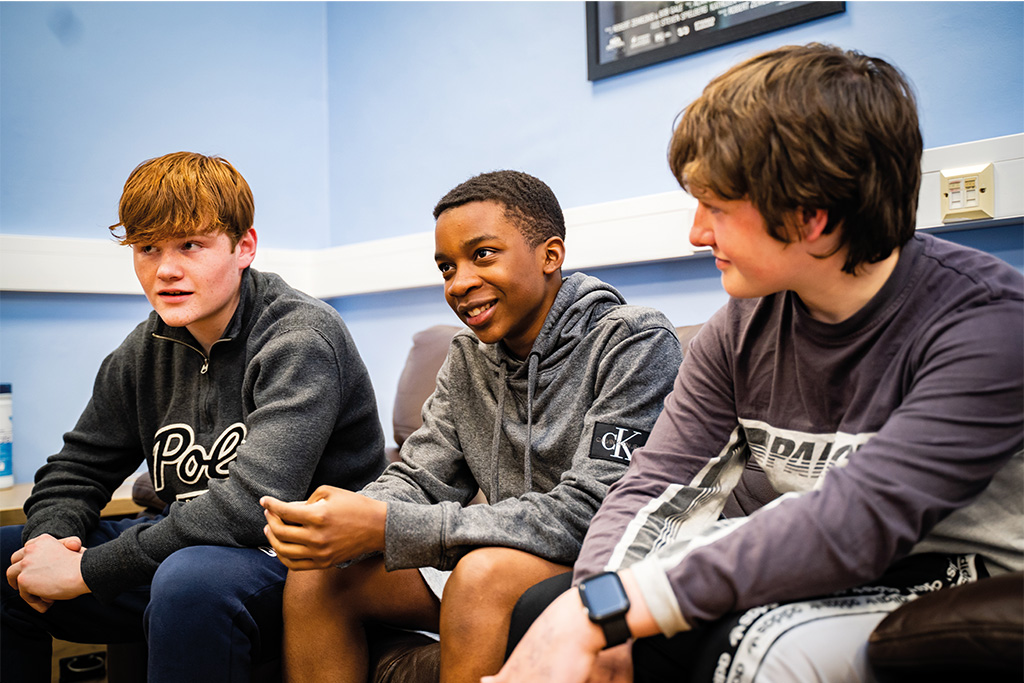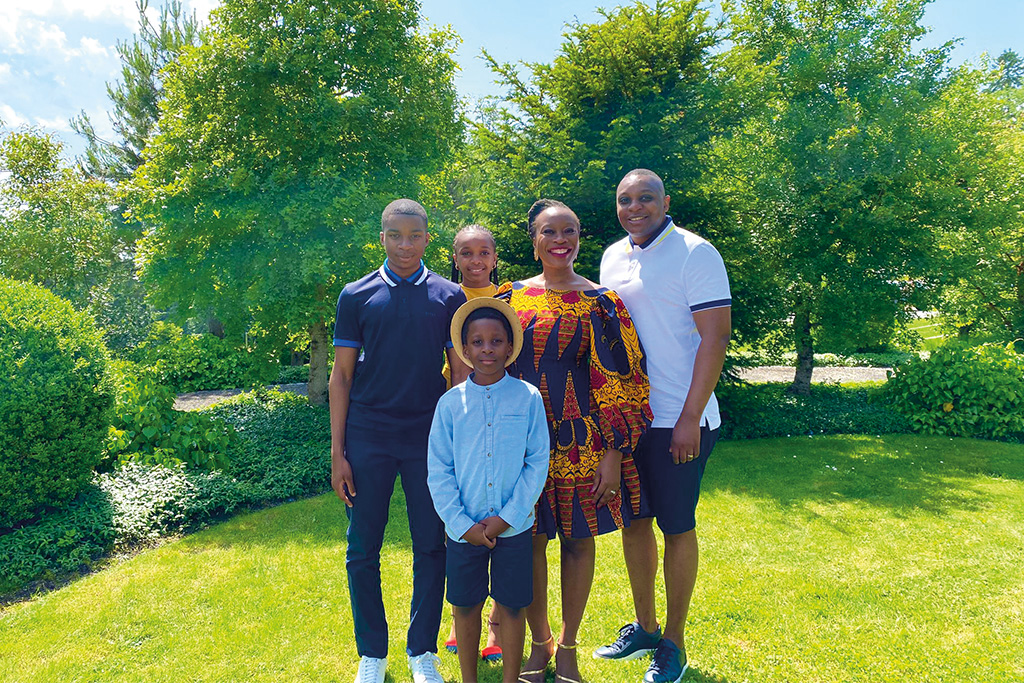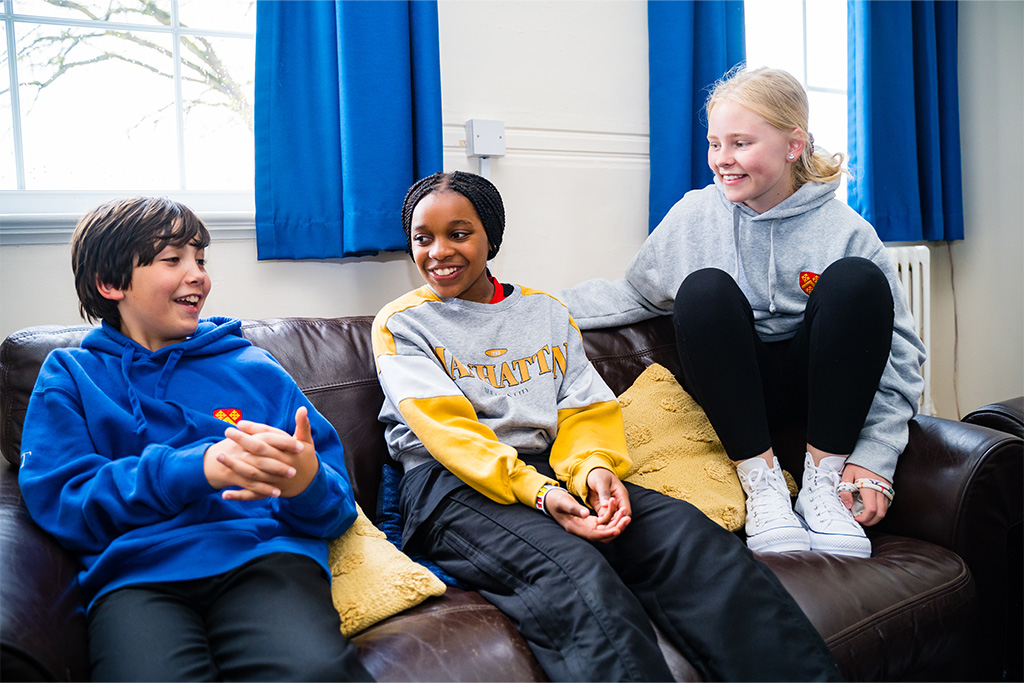View From Abroad
By
2 years ago

Sending children to boarding school in another country is an adventure for all, says mother-of-three Lisa Chuma

Lisa Chuma, 38, lives in Zug, Switzerland, with her husband, Timothy, 43, and their three children. The older two, Tawana, 16, and Thabiso, 13, both board at Felsted School in Essex and Thato, eight, will go in two years. Here, she explains why choosing to send her children to board from abroad was such a good idea, and gives advice to others contemplating the same move.
Lisa says: ‘Dropping off my oldest son, Tawana, at school at the age of ten wasn’t easy for either of us. It was the first time I’d ever left him anywhere, and I still have a picture in my head of him sitting on his bed in the shared dorm, clearly thinking, ‘Is this it?’. But he had already spent Reception and Year One at Felsted – a beautiful co-ed boarding school in Essex, so he wasn’t in entirely unfamiliar surroundings.
‘Besides, as well as him returning for taster days, we’d spent the previous year building up to this moment. Timothy and I had talked to him about how much fun boarding was going to be, while letting him know that he wasn’t being sent away from us, and that if he wasn’t happy, he didn’t have to stay. Two hours after we left, he phoned us up. ‘I’ve tried it,’ he said. ‘It’s not working.’ Six years later, Tawana feels that he has two homes in two countries, between which he moves confidently and happily.
‘I think that there are misconceptions about children boarding from abroad. From our point of view, it was a carefully considered choice for our children. We believed that we were giving them the gift of independence and the chance to become global citizens who would be comfortable with different countries and cultures.
‘As a family, we moved to Switzerland in 2011 – my husband works for a medical technology company in Neuchatel, and I work for a pharmaceutical company in Zug. We absolutely wanted to embrace living abroad, so the children were enrolled in local schools in order to learn German and make friends. I think it’s important that they have a good social circle at home. Ultimately, we knew we wanted them to be educated in England, and felt that boarding in Year 5 was a good time to settle in before any of the pressures of Common Entrance and senior school.
‘It was easier because many English boarding schools are so excellent. I recommend looking at least two or three years beforehand and keeping an eye on the school over the years. Consider your child’s needs; what are the facilities like throughout the school? Do they have good pastoral care and learning support? Will the learning environment suit them? And does the approach to building friendships correlate with what you think?
‘We fell in love with Felsted the first time we saw it. It’s in the middle of the countryside, with a long and fascinating history, and all the facilities you’d expect, including three squash courts, a professionally managed gym, a state of the art music school and partnerships with such great teams as Saracens & Northampton Rugby.

‘Of course, it’s not been entirely seamless – the transition from Year 7 or 8 to 9 was a tricky phase for both Tawana and our daughter, Thabiso, because they were growing up and were prep school seniors, but abiding by younger prep school rules. We didn’t ever question our decision, but they found that time hard. I’ve since learned that those years are frequently tricky as children become teenagers.
‘Boarding has allowed them to make their own decisions – both in sports and academic subjects – in a safe place and a supportive environment without us influencing them and them wondering what our expectations were. My oldest son was always looking out for the younger ones at home. This has given him space and freedom.
‘They have learned to respect and appreciate different cultures. Our family originally comes from Zimbabwe and the children live in Switzerland and go to school in England. They are exposed to different languages and different mentalities. Building a network of friends from different countries will be beneficial whatever they decide to do in the future.
‘Being in a boarding house means they have role models among their peers. Their friendships are incredibly precious to them, and I think they have to navigate quite adult relationships because they spend so much time with friends. They’re all very sociable, but also very loyal.
‘A friend said to me the other day that we have a good relationship with our kids because they don’t live at home the whole time. Some people think you might lose contact with your kids if they live in a different country. We believe it’s brought us closer together as a family. From the very first day, Tawana called us daily with an update – I rather wish those happy, chatty days were still with us now he’s 16 and I’m lucky to get a call a week!
‘We see them every two or three weeks, and when they are at home, we have all the important conversations – about relationships, sex and alcohol. When they’re at home, time is so precious, and we drop everything to spend time with them and make the most of it; travelling as a family and enjoying meals together. My daughter is an excellent baker, and my son cooks well – so we don’t have to make meals. It’s lovely!

‘A few weeks ago, my son was invited to a party. As parents, we had initially agreed that he could go, but in the end, it was the school’s decision that full boarders couldn’t attend. I had a conversation with them, during which they expressed some concerns relating to the safety of pupils. I fully agreed with their decision and was extremely pleased that their pastoral care was so strong, in that they continued to take an interest in events taking place outside school at the weekend. It provided us with additional reassurance.
‘Communication with the school is vitally important, and we’ve learned that it’s as much or as little as you wish. But you have to trust that they know what they’re doing.
‘Ultimately, I feel that the children are far more prepared for university and adult life. During Covid, I wasn’t able to travel with them, and they had to negotiate public transport and airports by themselves.
‘Last week, my son was playing in the local rugby team final in Zug. He got a flight over, played the game, won, celebrated, got himself back to school by Sunday afternoon and was doing his prep by 6 pm. He is completely self-reliant, and it’s a joy to watch.
‘My daughter has had to learn how to manage her money without us on hand to indulge every whim (or be persuaded!). It took some time, but now she has a monthly allowance, and that’s the end of it!
‘We see boarding abroad as a huge privilege. Neither of us come from wealthy backgrounds, and we had our children very young – but we have worked incredibly hard and made sacrifices in order to give them what we believe is the very best start in life and a stepping stone to the future.
‘It’s borne out by our three very happy and well-balanced children who love their school and home. My daughter was only two when we left England, and Felsted was just a dream for her. Now the younger one can’t wait to go himself.’
As told to Alice Smellie.
See Felsted’s online listing here.



